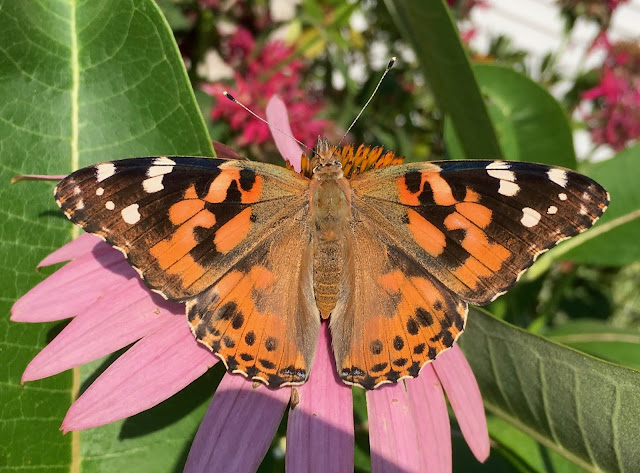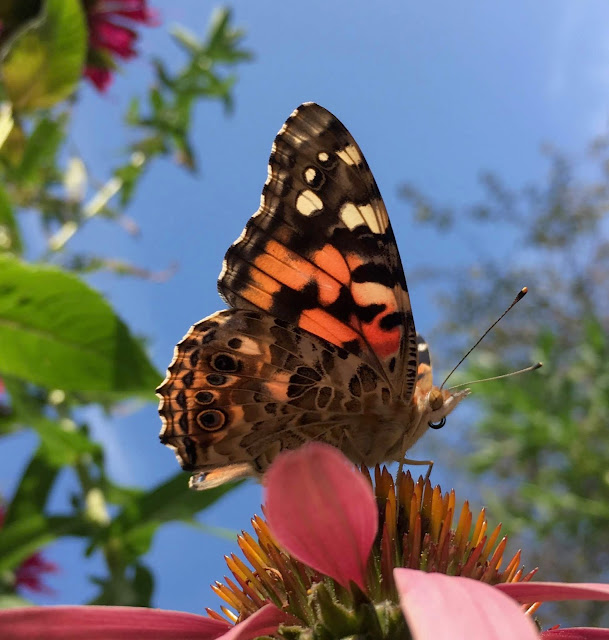The Big Sky is the first novel in A.B. Guthrie's trilogy about the opening of the American west (the sequel to this novel (The Way West) won the Pulitzer Prize in 1950). Set in the 1830s, the story follows a Kentucky boy as he voyages up the Missouri to its headwaters and becomes a mountain man. The protagonist is a crude, uneducated, quick-to-violence loner who has been compared to Faulkner's Mississippi characters. I first read the book back in 1996 and decided it was time to give it a final goodbye read. Guthrie is a admirable prose stylist, and the book has a lot of evocative passages, such as this one about a trapped beaver -
"He saw now that she had been at work on her leg. A little bit more and she would have chewed herself free. There were just the tendons holding, and a ragged flap of skin. The broken bone stuck out of the jaws of the trap, white and clean as a peeled root. Around her mouth he could see blood.The repeating "out of eyes..." is also reminiscent of Faulkner. The unspecified something "just beyond the edge of his mind" is I think the similarity of the beaver's eyes to those of his wife.
She looked at him, still not moving, still only with that little shaking, out of eyes that were dark and fluid and fearful, out of big eyes that liquid seemed to run in, out of eyes like a wounded bird's. They made him a little uneasy, stirring something that lay just beyond the edge of his mind and wouldn't come out where he could see it.
She let out a soft whimper as he raised the stick..."
"He would sit at the campfire and smoke or go about the horses or tend to the skins, and a man would know that he was away back in his mind, seeing old things, things that had happened long ago... It was age getting him, likely; a man was lucky if he didn't grow too old and have to think that the best of what was going to happen to him had already happened. God was mighty mean in some ways, letting a body get on to the point where he always hungered to turn back, making him know he wasn't the man he had been, making his bed cold but keeping in his mind the time when it wasn't. It was like a man was pushed backwards down hill, seeing the top getting farther from him every day, but always seeing it, always wishing he could go back."And also some interesting new words:
"Boone knocked out his pipe and sat still, letting time run by. Each part of time was good in itself, if a man knew to enjoy it and didn't press for it to pass so as to get ahead to something different."
"Boone walked over and let himself out of the room. Rooms made a man feel shut in on himself; they made him uneasy, so’s his mind never rightly put itself to a thing but kept thinking about a way out, like a mouse in a bucket."
"When he came to a town, though, it wasn’t any better, with fools staring and wagging tongues and thinking as how one man ought to be like another and all knuckling under to rules and ways and work and sheriffs and judges, and calling themselves free. And all living smothered by walls and roofs, breathing air that the good was gone from, breathing each other’s stinks and the stinks that the hogs made in the pens back of the houses."
"He limped to the wall, making an uneven thump on the puncheon floor.." Apparently a split log or heavy slab of timber used for flooring.
"He ate it all, ending by crunching up the softer bones [of the chicken] and sucking out the pockets of lights..." I'm familiar with "lights" being used in reference to the lungs; here it presumably refers to fatty marrow, which would be light and float on water.
"His hand reached into the pocket of his black coat and came out with a key through which a whang was looped." A leather thong. The alternative meaning of "penis" doesn't seem applicable...
"... had found work in a store, where he got to parcel out beans and meal and copperas." Crystals of iron sulfate is all I could find - not sure how they would be used by pioneering families. Addendum: thoroughly explained here, with a hat tip to reader Bob the Scientist.
"Boone had just pulled the trigger on the cow and heard the punkiny sound of the ball as it went home." Beats me. Perhaps the sound of a bullet penetrating a pumpkin?
"Summers felt his legs playing out on him. His head was dauncy, as if it wasn't fixed rightly to his neck." Derived from the Gaelic, "the American sense, in either spelling, has always been rather a regional term, and these days is rare. The usual meaning is of a person who is feeling sick, weak, lacking in vitality, or not completely well."
"Let them bring their beaver to him, and he would bring them strouding and paints and sky-blue beads and powder and ball and alcohol and all that made a nation happy and great." A coarse cloth used in trading with Native Americans, apparently derived from the name of the town in England.
"The wind was warm, coming over the mountains, and notionable. Sometimes it cried shrill and wintry in the branches of the trees and then it would ease up and be no more than a whisper..." I couldn't find a strict definition applicable to wind, but apparently the sense of a notion being vague and poorly-formed is applied to a wind that is variable in direction and intensity.
"Boone looked back at the horse. With his mane roached and his tail combed he made a pretty sight." Trimmed so that the hairs stand straight up, like a Mohawk. Couldn't find an applicable etymology.
"How's a man to know? Goddam it!" "I didn't mean to r'ile you." I've seen "rile" used many times, but never with an apostrophe to indicate an elision. Rile is related to roil, which comes from the French rouiller, so maybe that's the pathway.
"Darkness seemed to squeeze around him - darkness and silence, made the darker and silenter by the little flame of the campfire and the mindless chuckle of the water." Apparently an acceptable alternative to "more silent."












































